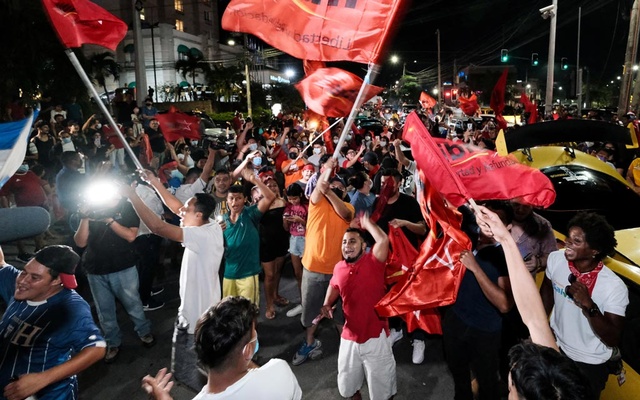

Hondurans celebrate win by Xiomara Castro, Nov. 28, election day.
On January 27, after nearly 13 years under a “narcodictatorship” responsible for thousands of assassinations, kidnappings and imprisonments, the people of Honduras will witness the inauguration of President-elect Xiomara Castro de Zelaya. She was the candidate of the Libre (Freedom and Refoundation) Party and is the spouse of former President Manuel “Mel” Zelaya — democratically elected but deposed in the U.S.-backed 2009 coup.


Hondurans celebrate win by Xiomara Castro, Nov. 28, election day.
Castro received close to 54% of the votes in the Nov. 28 election. The candidate of the National Party — the current President Juan Orlando Hernandez, who stole the election in 2013 and again in 2017 by way of terror and fraud — has conceded defeat.
This is an enormous victory for the Honduran resistance and testament to the courage of the people, who adopted the slogan: “They fear us because we have no fear.” The U.S.-trained and funded military police, along with ultraright paramilitaries, have created a living hell for the Honduran people, targeting women and gender-oppressed people, the LGBTI+ community, educators, unionists, environmentalists, human rights advocates and the Indigenous and Afro-descendent communities.
In the lead-up to the 2017 election, close to 30 opposition candidates and campaign workers were assassinated, a pattern repeated in the current election cycle.
In addition to political terror and repression, the Honduran people have one of the highest rates of poverty and income inequality in the Western Hemisphere. The percentage of Hondurans in poverty ranges from 62% to 74%, with 40% in “extreme poverty” by global standards. In a country of 10.1 million people, some 1.3 million are food insecure. Poverty has been compounded recently by COVID and two hurricanes. (Rights Action, Nov. 23)
Unions have been crushed and labor rights undermined. “There has been a growing deregulation of labor, coupled with the deepening of labor flexibilization [a threat to secure jobs and income] and insecurity. One of the most nefarious laws has undoubtedly been the Hourly Employment Law: Rights have been lost, and permanent jobs have been made precarious,” said Joel Almendares, secretary general of the United Confederation of Honduran Workers.
It’s little wonder that the people would choose a self-described “democratic socialist” over the brutal coup regime supported by wealthy oligarchs such as the Atala Zablah and Facussé family dynasties. The masses are celebrating Xiomara’s victory in the streets.
Xiomara Castro at a Nov. 28 rally.
Castro promises change
Castro, who will become the first woman president of Honduras, has promised to reverse the dire fortunes of the Honduran people. Concretely this means establishing the right to health care, food, housing and employment. With the largest number of migrants entering the U.S. coming from Honduras, Castro points to “the lack of employment as one of the most serious factors in the expulsion of the population.”
Castro has pledged to overturn laws that have allowed corruption to flourish and the country to be run by what she calls a “narcodictatorship.” Tony Hernandez, brother of the current president, was extradited to the U.S. on drug trafficking charges and is serving a life sentence here. Castro has vowed to democratize the country, calling for a Constituent Assembly to rewrite the Honduran Constitution.
The president-elect has promised protection of the rights of women and the LGBTI+ community.
Popular organizations are reminding the people of the need to maintain power in the streets. The Civic Council of Popular and Indigenous Organizations of Honduras (COPINH) stated: “We remind social organizations and conscious citizens that a project of radical and profound change in our society necessarily implies continuing the struggle, dialogues and organization to dismantle the current powers that are contrary to the rights of the majority, and to exercise popular power.” The beloved leader of COPINH, Berta Cáceres, was assassinated in 2016, but the popular saying is that “she didn’t die; she multiplied.”
Miriam Miranda of the Black Fraternal Organization of Honduras commented: “Xiomara can become president, but how is she going to govern when a whole platform of economic, political and military power will always be fighting against her.
“So, whoever wins, we have to build another form of coexistence, different pacts that allow us to move forward and to face key issues such as the climate crisis. Corporations are destroying the habitat and are looting all natural resources. So you have to build awareness on the one hand, but also take decisions about those businesses that are destroying nature to such an extent. It is a debate that is taking place around the world.” (tinyurl.com/54u3d8rm)
The president-elect said in her victory speech Nov. 28, “Today I want to say from the depths of my heart, so that the Honduran people feel it: No more war! No more hate! No more death squads! No more corruption! No more drug trafficking and organized crime! No more ZEDES [“Special Economic Development Zones”]! No more poverty and misery in Honduras! Until the final victory, united, the people together, we are going to transform our country! “
Martha Grevatt, as part of a delegation from the International Action Center, was a human rights observer during the 2013 Honduran presidential election.
Boston, April 20, 2025 The leadership of the Democratic Party nationally and especially in Massachusetts…
Hamas – Islamic Resistance Movement made the following call, “Gaza cries out to you —…
The centennial of the birth of Malcolm X, also known as El-Hajj Malik El-Shabazz, is…
In a courageous act of solidarity with the Palestinian people, a Moroccan port workers’ union…
Buffalo, New York A large group of demonstrators marched on the Buffalo ICE (U.S. Immigration…
In the 1950s, when Japan and much of Europe was in ruins, the U.S. accounted…